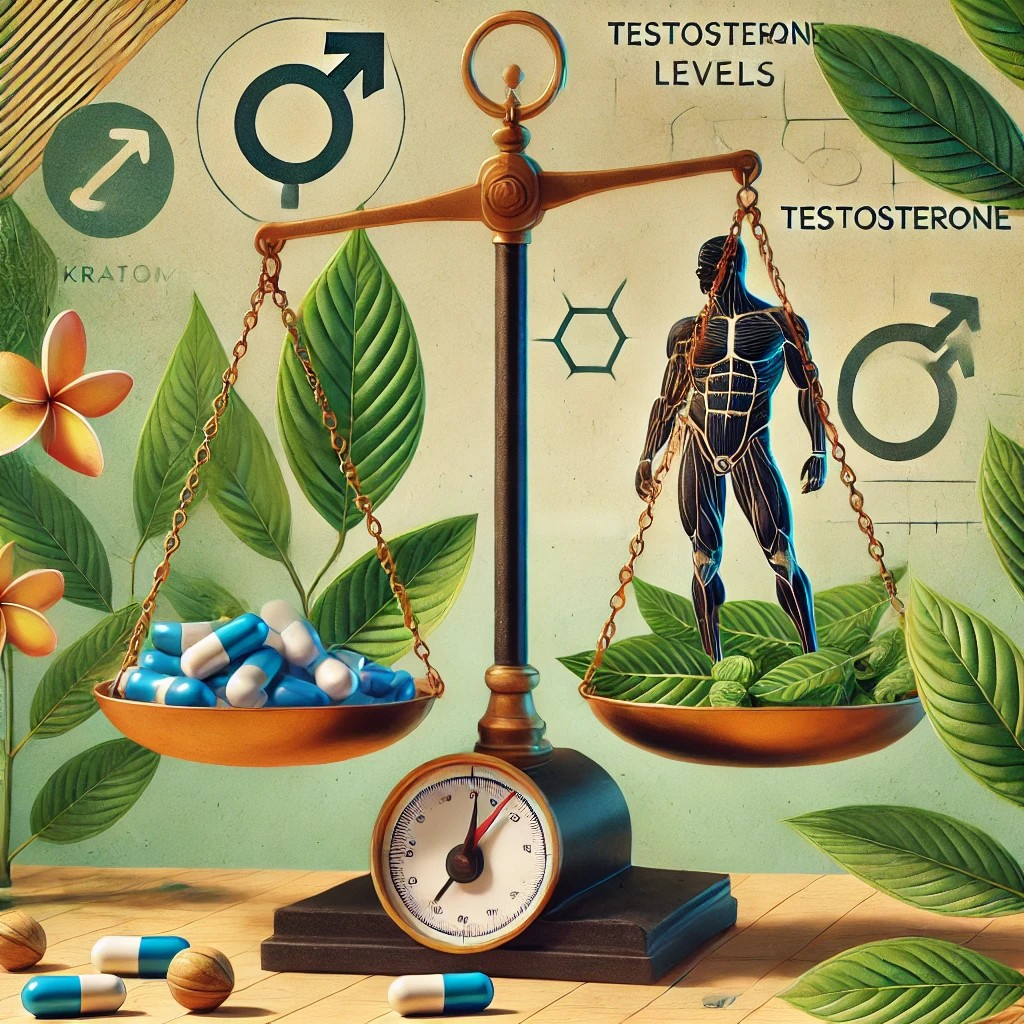Understanding the potential effects of substances like Kratom on the body is essential for anyone considering its use. Kratom, sourced from the leaves of the Mitragyna speciosa tree indigenous to Southeast Asia, is frequently utilized for pain relief, boosting mood, and aiding in opioid withdrawal. However, with its rising popularity, questions have surfaced about its impact on various aspects of health, including whether or not Kratom lowers testosterone levels. Testosterone is a critical hormone that plays a significant role in male health, influencing everything from muscle mass and bone density to mood and libido. The relationship between Kratom consumption and testosterone is not entirely clear, leading to concerns about its long-term use and potential side effects.
Mass Tort America is dedicated to helping individuals understand the potential risks associated with substances like Kratom. If you’re considering using Kratom or have already started, understanding how it might impact your testosterone levels is crucial. We are here to provide you with the information you need to make informed decisions about your health. If you believe that Kratom may have negatively affected your testosterone or overall health, our team can help you explore your legal options.
What Is Kratom, And How Does It Work?
Kratom is an herbal substance that has gained popularity in the United States as a natural remedy for various ailments, including chronic pain and anxiety. It contains active compounds known as alkaloids, with mitragynine and 7-hydroxymitragynine being the most prominent. These alkaloids interact with the brain’s opioid receptors, which is why Kratom is often used as an alternative to traditional opioids for controlling opiate withdrawal symptoms. The effects of Kratom can vary significantly depending on the dosage; at low doses, it acts as a stimulant, while at higher doses, it has sedative and opioid-like effects.
The interaction between Kratom and the brain’s receptors is complex. While it can provide relief from pain and boost mood, it can also lead to dependency and tolerance over time, known as Kratom addiction. This is because Kratom’s alkaloids mimic the effects of opioids, binding to the same receptors in the brain. Ongoing use of Kratom, especially prolonged Kratom use, can lead to the body developing a tolerance, requiring higher doses to achieve the same effects, which increases the risk of side effects, including potential hormonal imbalances and Kratom withdrawal.
One of the primary concerns regarding Kratom use is its impact on the endocrine system, particularly testosterone hormone levels. While there is limited scientific research directly linking Kratom to significant hormonal changes, the way Kratom interacts with the body’s receptors suggests that there could be an indirect effect. As Kratom binds to opioid receptors, it may disrupt the natural production of hormones, including testosterone, which could have various health implications, such as decreased libido and sexual dysfunction.
Potential Impact Of Kratom On Testosterone Levels
Testosterone is a vital hormone that affects many aspects of health, particularly in men. It regulates libido, energy levels, muscle mass, and even mood. A decrease in testosterone levels can lead to symptoms like fatigue, decreased libido, and loss of muscle mass, which are concerning for individuals who rely on Kratom regularly. Although research on Kratom’s direct impact on testosterone is limited, there is evidence to suggest that long-term use of opioids, and potentially Kratom, can lead to reduced testosterone levels, a condition known as opioid-induced androgen deficiency (OPIAD).
Given that Kratom acts on the same receptors as opioids, it’s plausible that similar effects could occur, potentially leading to lower testosterone levels. Some users have reported experiencing symptoms consistent with low testosterone after prolonged Kratom use, such as fatigue respiratory depression, sexual dysfunction, and decreased libido. However, these reports are largely anecdotal, and more research is needed to determine whether Kratom directly causes a decline in testosterone levels or if it indirectly affects hormone production.
Moreover, Kratom’s potential to disrupt the endocrine system could extend beyond testosterone. The body’s hormonal balance is delicate, and any substance that alters this balance can lead to a cascade of health issues. While some users may not experience significant changes in their testosterone levels, others might be more susceptible to hormonal disruptions due to factors like genetics, overall health, and the dosage and duration of Kratom use. Additionally, the relationship between kratom and drug alcohol depend highlights the broader implications of substance dependencies, including the potential for withdrawal symptoms and interactions with other drugs affecting serotonin and dopamine levels.
What You Should Know Before Using Kratom
Before incorporating Kratom into your routine, it’s essential to weigh the potential benefits against the possible risks. While Kratom may offer relief for chronic pain and anxiety, the potential impact on testosterone levels and overall hormonal health cannot be ignored. It’s crucial to approach Kratom use with caution, particularly if you have a history of hormonal imbalances or are concerned about your testosterone levels.
If you choose to use Kratom, monitoring your health closely is advisable. Pay attention to any changes in energy levels, libido, mood, and physical health. If you suspect that Kratom is affecting your testosterone levels, consulting with a healthcare professional is essential. They can help you assess whether Kratom is the cause and guide you on the best course of action, which may include adjusting your Kratom dosage, discontinuing use, or exploring alternative treatments. Additionally, if Kratom is being used to manage opioid withdrawal, a healthcare professional can offer safer alternatives or assist with a controlled tapering plan.
Understanding the legal landscape around Kratom is also important. Kratom is not regulated by the FDA, and its legal status varies by state. If you experience adverse events from Kratom use, you may have legal options to explore, particularly if you believe that you were not adequately informed about the risks. It’s essential to stay informed and consult with legal professionals who can provide guidance based on the latest research and regulations, including how Kratom’s status as a recreational drug or controlled substance might affect your rights.
The Endocrine System And Its Role In Hormonal Balance
The endocrine system is a network of glands that produce hormones responsible for regulating various bodily functions. Hormones like testosterone, estrogen, and cortisol are vital for maintaining balance in the body. The system’s delicate nature means that any disruption can lead to significant health issues. Substances like Kratom, which interact with the body’s receptors, have the potential to disrupt this balance, leading to hormonal changes and possibly impair testosterone levels.
When Kratom binds to opioid receptors, it may interfere with the endocrine system’s normal functioning, leading to a reduction in testosterone production, similar to the effects observed with chronic opioid use. The endocrine system’s sensitivity to external substances highlights the importance of understanding the full scope of Kratom’s effects, especially for those using it regularly. Regular Kratom users should be aware of these potential risks, particularly concerning hormone levels and the associated effects on health.
The relationship between the endocrine system and testosterone is particularly crucial for men’s health. Testosterone levels naturally decline with age, but external factors like Kratom use could accelerate this process, leading to earlier or more pronounced symptoms of low testosterone. Understanding this connection is key to making informed decisions about Kratom use, especially when considering the potential for testosterone-impairing effects and their impact on male sexual function.
Comparing Kratom To Other Substances That Affect Testosterone
Kratom is not the only drug alcohol that has been linked to potential changes in testosterone levels. Opioids, anabolic steroids, and even excessive alcohol consumption have been shown to lower testosterone levels in men. By comparing Kratom to these substances, we can better understand its potential risks. For instance, traditional opioids are known to cause opioid-induced androgen deficiency, a condition characterized by significantly lowered testosterone levels.
Opioids are well-known for their ability to reduce testosterone levels, leading to conditions like OPIAD. Since Kratom interacts with the same opioid receptors as opioids, it’s reasonable to consider that similar effects could occur, potentially leading to lower testosterone levels and the accompanying issues like erectile dysfunction. However, Kratom’s impact may vary depending on the dosage, frequency of use, and individual susceptibility, which necessitates further research to fully understand its effects.
Steroids, often used to increase muscle mass and athletic performance, can also lead to a decrease in natural testosterone production when used improperly. This comparison underscores the importance of using substances like Kratom with caution, as the potential for hormonal disruption is a serious consideration. Unlike steroids, which are typically used in controlled settings, Kratom is often self-administered, increasing the risk of misuse and subsequent health issues, such as Kratom dependency and physical withdrawal symptoms.
Signs And Symptoms Of Low Testosterone And Sexual Dysfunction
Low testosterone levels can manifest in various ways, affecting both physical and mental health. Common signs include fatigue, reduced libido, muscle loss, and mood changes such as depression or irritability. Understanding these symptoms is crucial for individuals who use Kratom, as they may indicate a need to re-evaluate its use. Kratom users should be particularly vigilant for these symptoms, as they might signal that Kratom consumption is affecting their testosterone hormone levels.
Fatigue is one of the most common symptoms of low testosterone. If you’re experiencing unexplained tiredness or a lack of energy, it could be related to a decline in testosterone levels. Similarly, a noticeable decrease in libido or sexual performance may also signal low testosterone, especially if it coincides with Kratom use. In some cases, these symptoms could be exacerbated by the psychoactive drugs’ physiological and behavioural effects that Kratom exerts on the body.
Mood changes, such as increased irritability or depression, can also be linked to low testosterone. These symptoms may be subtle at first but can worsen over time if the underlying cause is not addressed. For those using Kratom, paying attention to these signs is essential, as they may indicate that the substance is affecting your hormonal health. Additionally, symptoms such as erectile dysfunction and changes in hematological and biochemical parameters may also be warning signs of impaired testosterone production.
Is There A Safe Dosage Of Kratom For Long-Term Use?
Determining a safe dosage of Kratom for long-term use is challenging, as individual responses to the substance can vary widely. While some users may not experience any adverse effects at low doses, others might be more susceptible to the potential risks, including hormonal changes and Kratom addiction. Understanding how to use Kratom safely is crucial for minimizing these risks, especially concerning hormone levels and the potential impact on male sexual function inventory scores.
At lower doses, Kratom typically acts as a stimulant, providing increased energy and focus. However, as the dosage increases, its effects become more sedative, which may lead to dependency and tolerance. This shift in effects also raises concerns about the long-term impact on hormone levels, as higher doses are more likely to interfere with the endocrine system and impair testosterone levels, leading to symptoms such as decreased libido and sexual dysfunction.
For those considering long-term Kratom use, it’s essential to start with the lowest effective dose and monitor your body’s response closely. Regular health check-ups, including hormone level tests such as measuring luteinizing hormone and follicle-stimulating hormone levels, can help identify any changes early on, allowing for adjustments in dosage or discontinuation if necessary. Consulting with a healthcare provider is always recommended to ensure that your use of Kratom is as safe as possible, particularly if you are using Kratom extracts or a powdered Kratom decoction.
Alternative Remedies For Pain And Anxiety
While Kratom is popular for its pain-relieving and anxiety-reducing properties, there are alternative remedies that may offer similar benefits without the same risks. Exploring these options can provide safer alternatives for those concerned about the potential hormonal effects of Kratom, particularly in maintaining hormonal balance and avoiding testosterone-impairing effects.
CBD, derived from the cannabis plant, has gained attention for its ability to relieve pain and anxiety without the psychoactive effects associated with THC. Like Kratom, CBD interacts with the body’s receptors but does not bind to opioid receptors, making it a potentially safer option for long-term use. Research into CBD’s effects on hormone levels is still ongoing, but early indications suggest it may have a more favorable profile compared to Kratom, especially concerning the risk of affecting circulating testosterone.
Other natural remedies, such as turmeric and ginger, have also been used traditionally to manage pain and inflammation. These herbs offer anti-inflammatory properties and have been shown to have minimal impact on hormone levels. Incorporating these alternatives into your wellness routine may provide relief from symptoms without the potential risks associated with Kratom use, such as Kratom dependency and the need for Kratom withdrawal.
Legal Considerations For Kratom Users
The legal status of Kratom in the United States is complex and varies from state to state. While some states have banned its use outright, others allow it with restrictions. Understanding the legal landscape is crucial for anyone considering Kratom use, as it may impact your access to the substance and your ability to seek legal recourse if you experience adverse effects, especially given the rising concerns about Kratom as an emerging drug and its classification by the Drug Enforcement Administration.
Kratom is not regulated by the FDA, which means that its safety and efficacy have not been evaluated by a federal agency. This lack of regulation also means that Kratom products on the market may vary significantly in quality and potency, increasing the risk of harmful side effects. For users, this legal ambiguity can be concerning, especially if you experience health issues that you believe are related to Kratom use. The growing number of Kratom exposures reported highlights the need for caution and awareness of potential legal implications.
If you have been negatively affected by Kratom and live in a state where it is legal, you may have the option to pursue legal action. Mass Tort America can help you navigate these complex legal waters, ensuring that you understand your rights and the potential outcomes of your case. Whether you are seeking compensation for medical expenses or holding manufacturers accountable for misleading claims, legal support is essential. With the increasing interest in further research on the physiological and behavioural effects of Kratom, staying informed and seeking legal advice is crucial.
Consulting A Healthcare Professional About Kratom Use
If you are considering using Kratom or have already begun, consulting with a healthcare professional is essential. They can provide personalized advice based on your health history and current condition, helping you understand the potential risks and benefits of Kratom use, particularly how it might affect your testosterone levels or overall hormonal health. This consultation is particularly important if you have concerns about Kratom’s impact on hormone production and whether it might contribute to low testosterone or other hormonal imbalances.
A healthcare professional can conduct tests to monitor your hormone levels and assess any changes that may occur with Kratom use. They can also help you develop a plan for safe Kratom use, including determining an appropriate dosage and identifying any potential interactions with other medications or health conditions. Regular check-ups are crucial for catching any issues early and making necessary adjustments, especially if you are experiencing symptoms like decreased libido, fatigue, or other signs of low testosterone.
For those already experiencing symptoms of low testosterone, a healthcare professional can offer treatment options to restore hormonal balance. This may include lifestyle changes, medication, or alternative therapies. By working with a healthcare provider, you can make informed decisions about your health and minimize the risks associated with Kratom use, ensuring that you maintain your overall well-being while managing any conditions that initially led to Kratom initiation.
Exploring The Risks of Kratom And Opioid Withdrawal
Like many substances that interact with the brain’s receptors, Kratom can lead to dependency and withdrawal symptoms if used regularly over a long period. Understanding the risks of Kratom withdrawal is essential for anyone considering discontinuing its use, as the symptoms can be challenging to manage without proper support. Kratom withdrawal symptoms can include both physical withdrawal symptoms and psychological distress, similar to those experienced during opioid withdrawal.
Kratom withdrawal symptoms can vary in intensity but often include irritability, fatigue, muscle aches, and mood swings. These symptoms are similar to those experienced with opioid withdrawal, although they may be less severe. The duration of withdrawal can also vary, with some users experiencing symptoms for a few days, while others may struggle for weeks. Regular Kratom users who are considering stopping should be aware of these potential challenges and seek medical advice to manage the transition effectively.
Managing Kratom withdrawal requires a comprehensive approach, including gradual tapering, support from healthcare professionals, and addressing any underlying conditions that Kratom was being used to treat, such as chronic pain or anxiety. For those experiencing severe withdrawal symptoms, medical intervention may be necessary to ensure a safe and comfortable transition away from Kratom use. Understanding the physiological and behavioural effects related to Kratom withdrawal can help in planning a successful cessation strategy, reducing the risk of relapse or prolonged discomfort.
Understanding The Psychological Impact Of Kratom Use
In addition to its physical effects, Kratom can also have a significant impact on mental health. While it is often used to manage anxiety and depression, there is a risk that long-term use could lead to psychological dependency or exacerbate existing mental health conditions. Understanding these risks is crucial for anyone using Kratom as a mental health aid, especially given the increasing anecdotal reports of Kratom addiction and the need for controlled research to fully understand its effects.
Kratom’s mood-enhancing properties are due to its interaction with the brain’s receptors, which can lead to a sense of euphoria at higher doses. However, this effect can also result in psychological dependency, where users feel they need Kratom to manage their mood or cope with stress. Over time, this dependency can lead to increased use, higher doses, and a greater risk of side effects, including impairments to mental health and hormonal balance.
For those using Kratom to manage mental health conditions, it’s important to explore alternative treatments and therapies that address the root causes of anxiety or depression. Cognitive-behavioral therapy, mindfulness practices, and other holistic approaches can offer long-term solutions without the risks associated with Kratom use. Consulting with a mental health professional is essential for developing a comprehensive treatment plan that prioritizes your well-being, especially when considering the potential long-term effects of Kratom on both mental and physical health.
How Can Mass Tort America Help You Aith Kratom Concerns?
At Mass Tort America, we understand the complexities of Kratom use and the potential health risks it poses. If you believe that Kratom has negatively impacted your testosterone levels improved sexual functioning or overall health, our team is here to help. We provide comprehensive legal services to individuals who have been affected by substances like Kratom, ensuring that your rights are protected and that you have the support you need to navigate the legal system.
Our national presence allows us to assist clients from all over the United States, and our Concierge Team is dedicated to coordinating every aspect of your case. We offer personalized legal counsel, focusing on your unique situation, and strive to hold responsible parties accountable for the harm caused. If you’re ready to explore your legal options, contact us today at 800-356-4338 or visit our contact form at https://masstortamerica.com/contact/. Our team is ready to provide the support and guidance you need to take the next step.



















